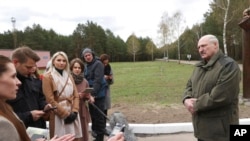Belarus' authoritarian leader said Saturday that he would change the law on presidential succession so that power in the Eastern European nation will be transferred if he dies to the national security council, where his son plays a prominent role.
Many observers have suggested that President Alexander Lukashenko, who has ruled with an iron fist since 1994, aims to establish a political dynasty, although Lukashenko denies this.
Lukashenko himself is the head of the national security council, but his eldest son, Viktor, also has a seat and is regarded as the council's informal leader.
Under current law, the prime minister takes presidential powers if the presidency becomes vacant, but Lukashenko said Saturday that the premier would be only the nominal leader and all decisions would be made by the 20-person security council. He said he would sign a decree to make the change soon.
Lukashenko last year faced months of large protests calling for him to step down in the wake of an August election widely viewed as rigged that gave him a sixth term in office.
Lukashenko has repeatedly alleged that the West fomented the protests. Last week, Russia arrested two Belarusians who allegedly were leading an attempt to organize a coup and Lukashenko's assassination. Lukashenko claims the plot had backing from the United States.
On Saturday, he claimed that NATO planned to send troops into the country if the coup occurred, bringing them to the Russian border.
"It was a springboard, I always told you, to attack Russia. It was the first step," he said.
Belarusian opposition leaders this week voiced fears that Lukashenko would seek much closer ties with Russia as his power wanes, leading to a loss of sovereignty for the nation of 9.5 million people. Lukashenko traveled to Moscow on Thursday for a meeting with Russian President Vladimir Putin.




